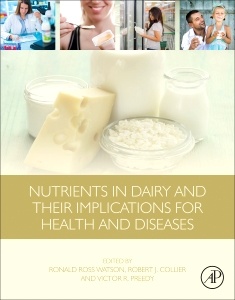Description
Nutrients in Dairy and Their Implications for Health and Disease
Coordinators: Watson Ronald Ross, Collier Robert J, Preedy Victor R
Language: English
Subjects for Nutrients in Dairy and Their Implications for Health and...:
Support: Print on demand
Description
/li>Contents
/li>Readership
/li>Biography
/li>Comment
/li>
Nutrients in Dairy and Their Implications for Health and Disease addresses various dairy products and their impact on health. This comprehensive book is divided into three sections and presents a balanced overview of the health benefits of milk and milk products. Summaries capture the most salient points of each chapter, and the importance of milk and its products as functional foods is addressed throughout.
Section A. Dairy Milk in Context: The Dairy Cow, Milk Production and Yield 1. Regulation of factors affecting milk yield 2. Dairy cow breeding and feeding on the milk fatty acid pattern 3. Milk, cheese and other food intake as measured by mobile apps and how that changes consumption 4. The health benefits of bovine colostrum 5. Pathogenic Bacteria in Cheese, their Implications for Human Health and Prevention Strategies 6. Immune system in undernourished host. Probiotics as strategy to improve immunity 7. Milk immunoglobulins and their implications for health promotion 8. Milk Production and Composition in Ruminants under Heat Stress 9. Effects of direct-fed microbials (DFM) on feed intake, milk yield, milk composition, feed conversion, and health condition of dairy cows 10. Processing of dairy products for flavour formation and their health benefits
Section B. Ingestion, Nutrients in milk and its products on Health 11. Dairy’s Inadvertent Contribution to Sustaining Optimal Iodine Nutrition 12. Dairy product (calcium) consumption and iron nutrition 13. Milk nutritive role and potential benefits in human health 14. Nutrients in Cheese and Their Effect on Health and Disease 15. Increasing B vitamins in foods to prevent intestinal inflammation and cancer 16. Lactose intolerance
Section C. Contaminants in Dairy Milk and their implications for Health 17. Milk Adulteration: a growing health hazard in Pakistan 18. Effect of synbiotic-assisted modulation of gastrointestinal microbiota on human health 19. Aflatoxin M1 contamination in milk and dairy products: Implications for human health 20. Contribution of dairy to nutrient intake in the Western diet
Section D. Preclinical Studies of Dairy Milk and Dairy Components on Health 21. Overview. Preclinical studies of dairy milk and products on health 22. Macro components in dairy and their effect on inflammation parameters: preclinical studies 23. Efficacy of milk derived bioactive peptides on health by cellular and animal models 24. Dairy as a functional food in cardiovascular disease 25. Effect of the fat component of dairy products in cardiovascular health, vascular structure and function 26. Beneficial and toxic compounds released by starter and secondary microbiota in dairy products
Section E. Milk as a Functional Food from Non-Bovine Sources 27.Minerals in sheep milk 28. Nutritional value of deer milk 29. Bioactive Components in Camel Milk: Their Nutritive Value and Therapeutic Application 30. Camel milk as a potential nutritional therapy in Autism 31. Nutritional value and potential health benefits of donkey milk 32. Influence of goat milk on bone and mineral metabolism during iron-deficiency recovery 33. Goat milk and oxidative stress during iron-deficiency anemia recovery 34. Role of Milk from Small Ruminant Species on Human Health 35. The Nutritional Value and Health Benefits of Goat Milk Components 36. Nutraceutical properties of Camel milk
Nutrition researchers, dairy and food scientists, graduate students, and health professionals (including nutritionists and dieticians)
Robert J. Collier received his B.S. degree in Zoology from Eastern Illinois University in 1969. After service in the Army Medical Corps he obtained his Master’s Degree in Zoology from Eastern Illinois University in 1973 and his Ph.D. in Dairy Science from the University of Illinois in 1976. His dissertation research was on the endocrine regulation of lactogenesis in the dairy cow. In 1976, Dr. Collier accepted an NIH post-doctorate at the Dairy Science Department of Michigan State University in the laboratory of Dr. Allen Tucker. His research was on the regulation of cortisol uptake in mammary tissue of cattle. In September, 1976, Dr. Collier joined the Dairy Science Department at the University of Florida as an Assistant Professor and continued his research on the endocrine regulation of lactation in cattle . . In 1985, Dr. Collier joined the Monsanto Company as a Science Fellow and initiated a discovery program in lac
- Presents various dairy products and their impact on health
- Provides information on dairy milk as an important source of micro-and macronutrients that impact body functions
- Addresses dietary supplements and their incorporation into dairy products
These books may interest you

Fermented Milk and Dairy Products 281.07 €



